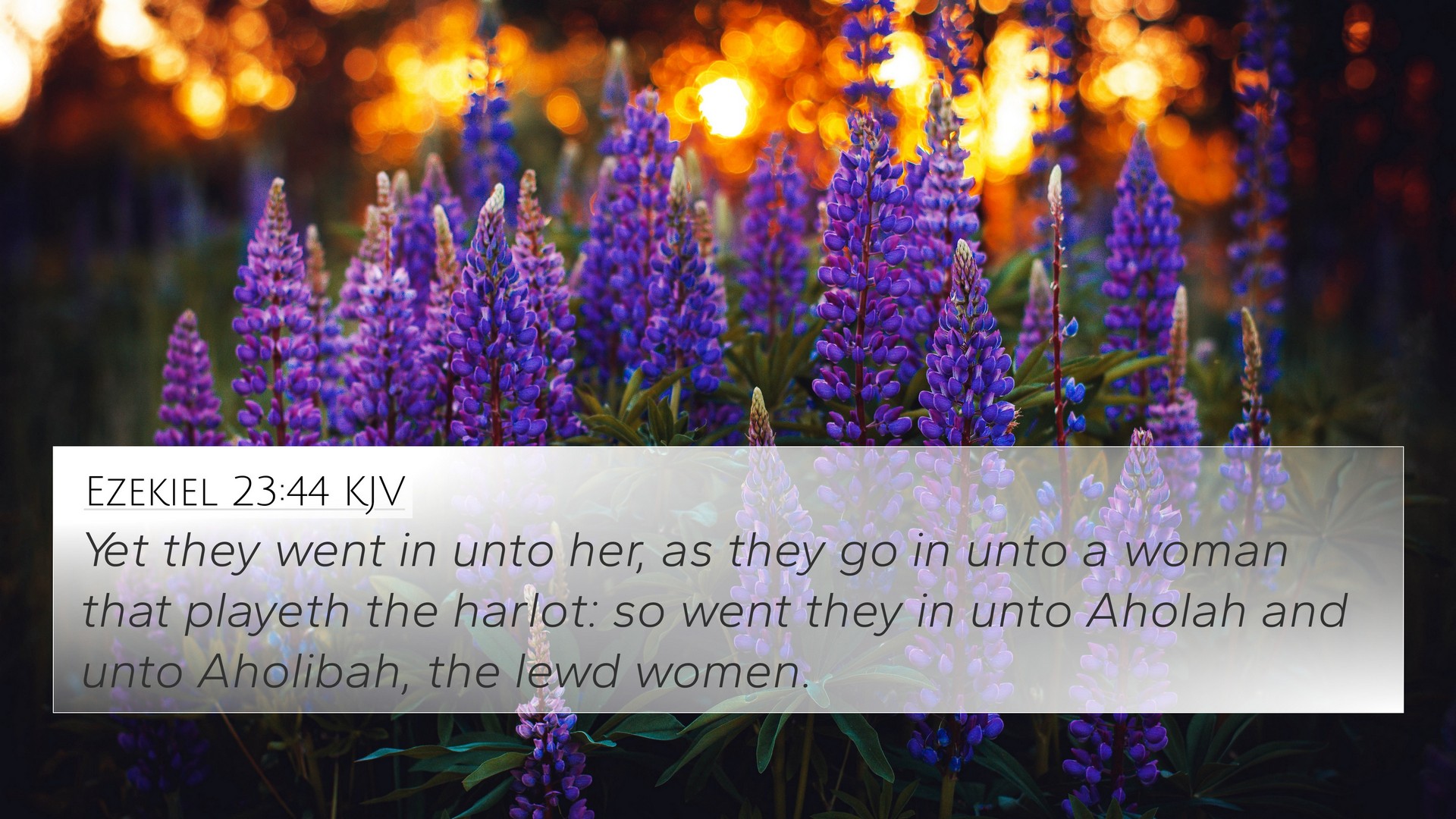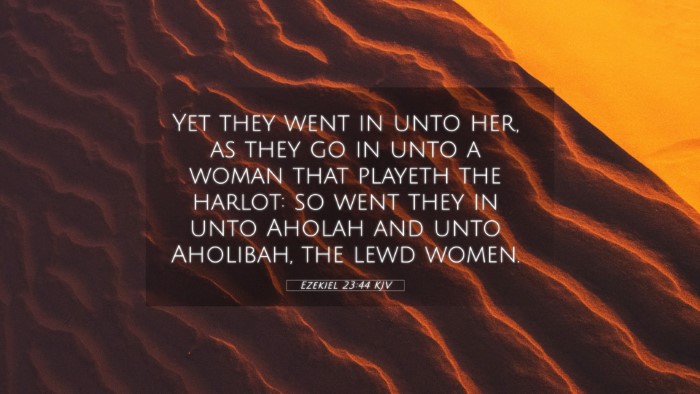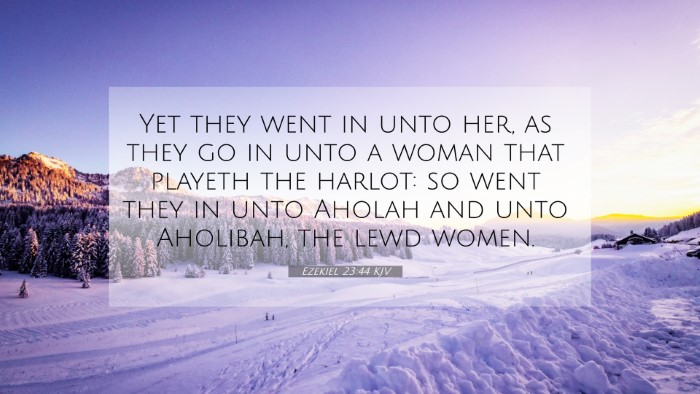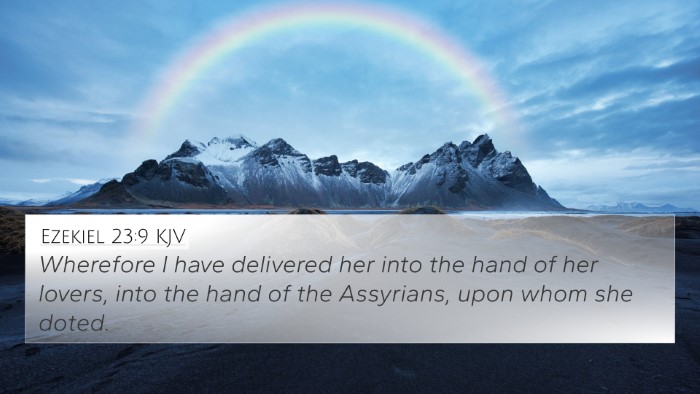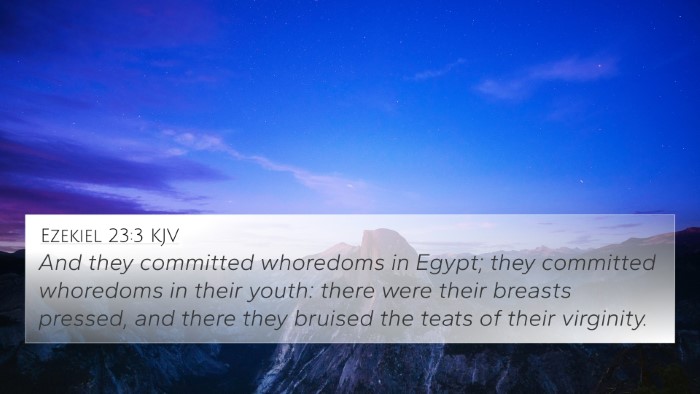Understanding Ezekiel 23:44
Ezekiel 23:44 states: "Yet they went in unto her, as they go in unto a woman that plays the harlot: so went they in unto Ahola and unto Aholibah, the lewd women." This verse reflects a powerful message about unfaithfulness and betrayal, using the metaphors of harlotry to express the infidelity of Israel and Judah towards God.
Contextual Overview
This verse appears in a larger prophetic narrative where God, through Ezekiel, addresses the two sister cities of Samaria (Ahola) and Jerusalem (Aholibah). The use of the metaphor of harlotry signifies a deep breach of covenant, showing how the people turned towards other nations and deities instead of remaining faithful to Yahweh.
Commentary Insights
- Matthew Henry: Henry emphasizes the shameful nature of idolatry and the disappointment of God, who sees His people turn to those who do not love them. He suggests that this act is akin to a betrayal, portraying the emotional depths of God's relationship with Israel.
- Albert Barnes: Barnes illustrates how the interactions between Ahola and Aholibah represent larger themes of spiritual unfaithfulness. He argues that the act of turning to foreign alliances is not just political but deeply spiritual, capturing the heart of Israel's disloyalty to God.
- Adam Clarke: Clarke delves into the implications of 'lewd women' as a description for these cities, pointing to the moral corruption that ensued when the people favored foreign gods over their Creator. His view connects this narrative to the broader theme of Divine judgment that follows such unfaithfulness.
Cross-Referencing Related Scriptures
For deeper understanding, we can explore the inter-Biblical dialogue between Ezekiel 23:44 and the following references:
- Hosea 1:2: This verse introduces the metaphor of harlotry to describe Israel's unfaithfulness to God.
- Jeremiah 3:6-10: Here, God laments over Israel's idolatry and betrayal, paralleling the themes in Ezekiel.
- Isaiah 1:21: Isaiah speaks of Jerusalem as a 'harlot', identifying the moral decay and spiritual compromise.
- Revelation 17:1-5: The imagery of a woman representing a great city brings the theme of unfaithfulness full circle into New Testament prophecy.
- Ezekiel 16:15: This verse elaborates on the concept of Israel's infidelity, making explicit the ties between national identity and spiritual loyalty.
- James 4:4: In the New Testament, James speaks against friendship with the world, echoing the sentiments found in Ezekiel.
- Matthew 12:39: Jesus references a 'wicked generation,' emphasizing the consequences of spiritual unfaithfulness.
Thematic Connections
The themes of betrayal, unfaithfulness, and judgment found in Ezekiel 23:44 resonate throughout both the Old and New Testaments, forming a comprehensive commentary on the nature of sin and its repercussions:
- Thematic Cross-References:
- Betrayal of Divine Trust
- Idolatry as Spiritual Harlotry
- The Consequences of Turning from God
- Faithfulness vs. Infidelity
Tools for Cross-Referencing
To further explore these connections and enhance one's study, utilizing tools for Bible cross-referencing can be beneficial. Methods include:
- Using a Bible concordance to find related verses.
- Consulting a Bible cross-reference guide for thematic studies.
- Engaging in cross-reference Bible study methods to dissect interrelated themes.
- Accessing comprehensive Bible cross-reference materials for in-depth understanding.
Conclusion
In conclusion, Ezekiel 23:44 serves as a stark reminder of the spiritual state of Israel, using vivid imagery to illustrate the severity of their unfaithfulness. By connecting this verse with others through careful cross-referencing, one gains a more profound understanding of the consistent themes of fidelity, judgment, and redemption that permeate the Biblical text. This practice enriches one's spiritual journey and provides insights into the nature of God’s relationship with His people.
